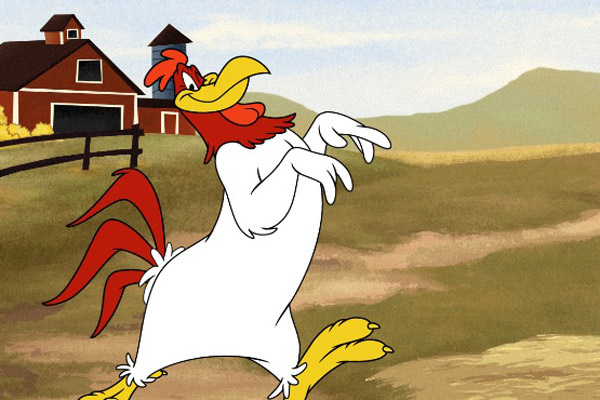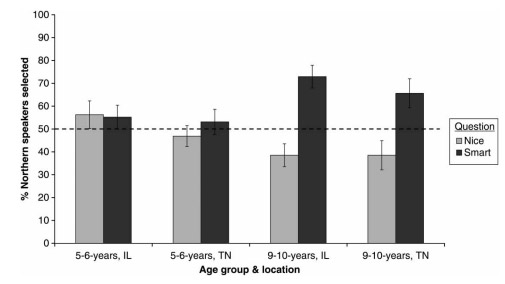
Now here's a study that was written with me in mind: "Northern=smart and Southern=nice: The development of accent attitudes in the United States" (PDF), by University of Chicago psychologists Katherine Kinzler and Jasmine DeJesus.
This may seem like a case of the science of the obvious, not that there's any lack of research into how people with Southern accents are considered dumb:
And it's more than just a few scattered people who connect Southern accents with incorrect speech. In a 1999 study by Michigan State University professor Dennis Preston, 150 southeastern Michigan residents were asked to rank the "correctness" of English spoken in all 50 states. The South as a whole ranked the lowest, with Alabama at the bottom of the list.
"There are two things going on in America: You either went to school and learned how to talk good, which is what Northerners think about themselves, or you didn't, which has been a common image people in the North have of the South," Preston said.
Many Southerners have chosen to reclaim their "r's" and shun the drawl for more standardized English pronunciations worthy of a network anchor.
It's true. In my first week in college, a classmate who answered a call for me told the room that my dad sounded "like he's in Dukes of Hazzard." I sound a lot less Southern, almost indetectably so, than I did when I was a kid. Once you get into higher education, you learn to go with a generic Union accent fast.
But it's not just adults who mark you as sweet and stupid if you have a drawl—the conclusion Kinzler and DeJesus found when asking kids from Illinois and Tennessee what they associate with Northern and Southern accents:
[C]hildren tested in Illinois expressed positivity towards Northern-accented speech: They chose Northern individuals as friends, and also chose them as has having more favourable personality attributes and as living in their geographical region. This result provides evidence that children’s social preference for native- over foreign-accented speakers (e.g., Kinzler et al., 2009) 2009) does not depend exclusively on a “native” vs. “foreign” distinction, but may also include a preference for a local vs. non-local regional dialect.
Children in Tennessee presented a different pattern of results. Overall, Tennessean children’s responses did not differ from chance. It is plausible that children in the South are exposed to both dialects and they therefore view both types of speech as equally favourable.
Or, maybe Southerners are actually nicer.
They also found that the stereotypes strengthen as kids age. Five- and six-year-olds from Illinois chose people with a Northern accent as nicer (56 percent), smarter (55 percent), and "in charge" (61.5 percent). Nine- and ten-year-olds hardened: nicer fell to 39 percent; smarter rose to 73 percent; though "in charge" actually fell slightly to 58 percent.

Depressingly, the perception of the Northern accent as smarter also hardened for kids from Tennessee:
Nine- to 10-year-old children living in both Illinois and Tennessee reported that Northern-accented individuals sounded “smarter” and “in charge”, whereas Southern-accented individuals sounded “nicer”. Interestingly, we observed that these attitudes were acquired among children living in both Illinois and Tennessee. Consequently, children endorsed both positive and negative stereotypes about their own groups, instead of evaluating their own group in a relatively more positive light for every attribute.
On the other hand, it's good to get some data on why no one listens to me: "The research presented here provides evidence that children begin to see accent as indicative of who is 'in charge' at least by age nine." It's one reason why I like blogging and social media: on the Internet, no one knows you're a hick.


